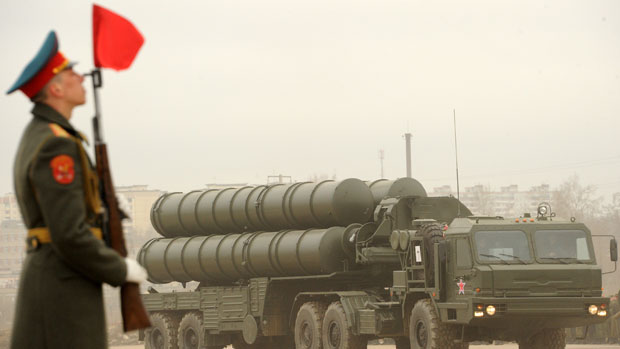Russia violated nuclear test ban treaty, says US
Obama accuses Russia of breaking Cold War test treaty with cruise missile launch

A free daily email with the biggest news stories of the day – and the best features from TheWeek.com
You are now subscribed
Your newsletter sign-up was successful
Barack Obama has accused Russia of violating a 1987 nuclear treaty signed by Ronald Reagan and Mikhail Gorbachev, declaring the breach to be "a very serious matter".
According to the US president, Russia tested a new cruise missile in contravention of the Intermediate-Range Nuclear Forces (INF) Treaty that came into force in June 1987.
White House officials confirmed that Obama had notified the Russian president Vladimir Putin of US objections to the tests by letter on Monday.
The Week
Escape your echo chamber. Get the facts behind the news, plus analysis from multiple perspectives.

Sign up for The Week's Free Newsletters
From our morning news briefing to a weekly Good News Newsletter, get the best of The Week delivered directly to your inbox.
From our morning news briefing to a weekly Good News Newsletter, get the best of The Week delivered directly to your inbox.
The claim comes at a "highly strained time" between the US and Russia, The Guardian says, and brings into the public sphere "allegations that have simmered for some time".
The Cold War treaty was designed to eliminate ground-launched missiles with ranges of 500 to 5,500 km (310 to 3,400 miles), Reuters reports.
"This is a very serious matter which we have attempted to address with Russia for some time now," a White House official said in a statement.
No details were given on when and where the violation occurred, but the New York Times reported in January that the US had warned Nato that Russia was testing a new missile.
A free daily email with the biggest news stories of the day – and the best features from TheWeek.com
According to officials, Russia may have been testing the cruise missiles since 2008, but it was only in 2011 that the Obama administration concluded that they were a "compliance concern".
In May last year, Rose Gottemoeller, the State Department's senior arms control official, first alerted Russia to US objections to the tests, but this is the first time they have been made public.
Nato's top commander, Gen. Philip M Breedlove, says that such violations require a response, the New York Times reports.
"A weapon capability that violates the INF, that is introduced into the greater European land mass, is absolutely a tool that will have to be dealt with," he said in an interview in April. "It can't go unanswered".
Daryl Kimball, executive director of the Arms Control Association, a Washington-based research and advocacy group described the development as "disturbing".
-
 Local elections 2026: where are they and who is expected to win?
Local elections 2026: where are they and who is expected to win?The Explainer Labour is braced for heavy losses and U-turn on postponing some council elections hasn’t helped the party’s prospects
-
 6 of the world’s most accessible destinations
6 of the world’s most accessible destinationsThe Week Recommends Experience all of Berlin, Singapore and Sydney
-
 How the FCC’s ‘equal time’ rule works
How the FCC’s ‘equal time’ rule worksIn the Spotlight The law is at the heart of the Colbert-CBS conflict
-
 Putin’s shadow war
Putin’s shadow warFeature The Kremlin is waging a campaign of sabotage and subversion against Ukraine’s allies in the West
-
 Alexei Navalny and Russia’s history of poisonings
Alexei Navalny and Russia’s history of poisoningsThe Explainer ‘Precise’ and ‘deniable’, the Kremlin’s use of poison to silence critics has become a ’geopolitical signature flourish’
-
 What happens now that the US-Russia nuclear treaty is expiring?
What happens now that the US-Russia nuclear treaty is expiring?TODAY’S BIG QUESTION Weapons experts worry that the end of the New START treaty marks the beginning of a 21st-century atomic arms race
-
 Epstein files topple law CEO, roil UK government
Epstein files topple law CEO, roil UK governmentSpeed Read Peter Mandelson, Britain’s former ambassador to the US, is caught up in the scandal
-
 Iran and US prepare to meet after skirmishes
Iran and US prepare to meet after skirmishesSpeed Read The incident comes amid heightened tensions in the Middle East
-
 Israel retrieves final hostage’s body from Gaza
Israel retrieves final hostage’s body from GazaSpeed Read The 24-year-old police officer was killed during the initial Hamas attack
-
 China’s Xi targets top general in growing purge
China’s Xi targets top general in growing purgeSpeed Read Zhang Youxia is being investigated over ‘grave violations’ of the law
-
 Ukraine, US and Russia: do rare trilateral talks mean peace is possible?
Ukraine, US and Russia: do rare trilateral talks mean peace is possible?Rush to meet signals potential agreement but scepticism of Russian motives remain